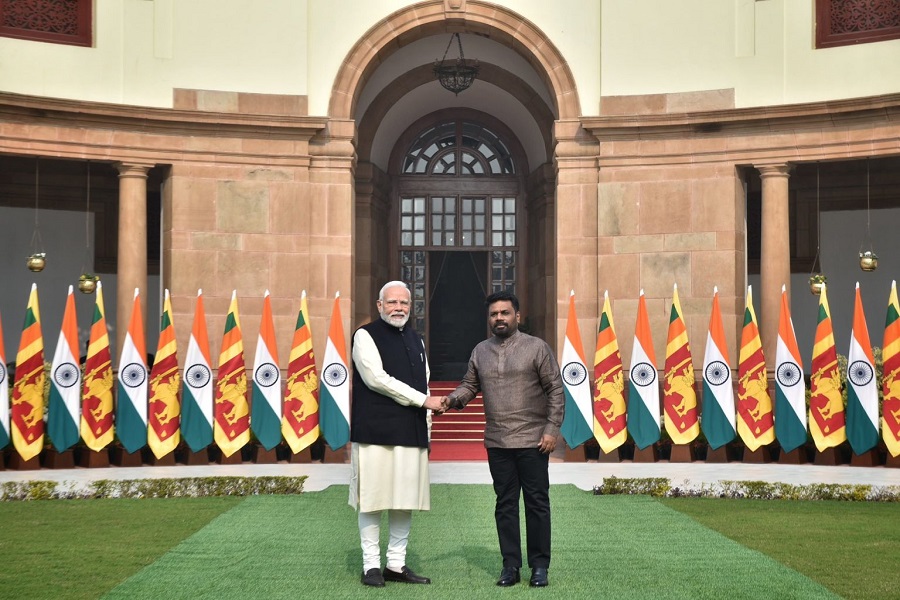
By News On Air Dec 16, 2024
India and Sri Lanka today exchanged protocol amending agreements between the two countries for avoidance of double taxation and prevention of fiscal evasion with respect to taxes in income. Both sides also exchanged MoU on training and capacity building of civil servants of Sri Lanka. After bilateral talks between Prime Minister Narendra Modi and visiting Sri Lankan President Anura Kumara Dissanayake in New Delhi, the agreements were exchanged. Both leaders held discussions on the issues of mutual interest.
Grant assistance of 14.9 million dollars for the signalling project in the Maho-Anuradhapura section was announced on the occasion. A financial assistance scheme to 100 new students each annually from the University of Jaffna and Eastern University until the end of academic courses of the beneficiaries was also announced. Acknowledging the increased political interactions in the last decade and their contribution towards deepening the bilateral ties, both leaders agreed to further intensify political engagements at leadership and ministerial levels. The two leaders also underscored the importance of regular parliamentary-level exchanges to promote democratic values and share expertise on their institutional best practices.
In his press statement, Prime Minister Narendra Modi expressed happiness that Mr Dissanayake has chosen India for his first foreign visit as President. He said the visit is creating new momentum and energy in the relations. Mr Modi said India has so far provided Lines of Credit and grant assistance worth five billion dollars to Sri Lanka. He said the people-to-people relations between India and Sri Lanka are linked to the civilisations. The Prime Minister said, that when the Pali language was given the status of Classical language in India, it was celebrated in Sri Lanka too. He said, both sides also discussed issues related to the livelihood of fishermen and agreed that both sides should proceed with a humanitarian approach in this matter.
In his statement, Mr Dissanayake said, he has given an assurance to the Prime Minister of India that they will not allow Sri Lanka to be used in any way in a manner that is detrimental to the interest of India. He said the cooperation with India will certainly flourish. Mr Dissanayake said, after becoming the President of Sri Lanka, this is his visit foreign visit and he is so happy that he was able to come to Delhi on his first State visit. He said this visit paved the way for the cooperation between the two countries to be developed further. Mr Dissanayake said Sri Lanka faced an unprecedented economic crisis some two years ago and India supported it immensely to come out of that quagmire. He said India has also helped Sri Lanka immensely after that, especially in the debt-free structuring process.
The visiting dignitary was accorded a ceremonial reception at the forecourts of Rashtarpati Bhavan this morning. President Droupadi Murmu and Prime Minister Narendra Modi welcomed Mr Dissanayake. The Sri Lankan President paid floral tributes to the Father of the Nation Mahatma Gandhi at Rajghat.
The Sri Lankan President who is on a three-day visit to India arrived in New Delhi on Sunday. He was received by Minister of State for Information and Broadcasting Dr L Murugan. The Sri Lankan President is scheduled to meet President Droupadi Murmu and Vice President Jagdeep Dhankhar this evening. He will also visit Bodh Gaya, Bihar. This is the first bilateral visit of President Dissanayake to India since he assumed Presidency.
Ministry of External Affairs said the visit is expected to further strengthen the multi-faceted and mutually beneficial cooperation between the two countries. Mr Dissanayake will also participate in a business event in Delhi to promote investment and commercial linkages between India and Sri Lanka. The Merchandise trade between India and Sri Lanka has reached 5.5 billion dollars in 2023-24. Sri Lanka is India’s closest maritime neighbour in the Indian Ocean Region and holds a central place in Prime Minister Modi’s vision of SAGAR and India’s Neighbourhood First policy.